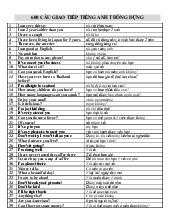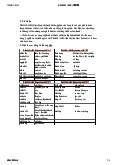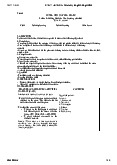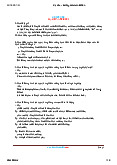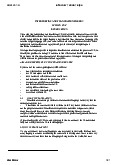

Preview text:
20:24 29/7/24
L-U6 - The Great Firewal of China
The Great Firewall of China
1/ What: (extracted from The Bloomberg)
A combination of tools, services, and rules that Chinese government employ to strictly
control the Internet services as well as online contents within Chinese territory.
It is a severe violation of the universal human rights of freedom of speech.
Many social media are blocked in Mainland China such as: Facebook, Google, YouTube,
etc. Instead, there are domestic equivalents of these: Baidu, Weibo, Weixin, Bilibili, etc.
Some news companies’ websites are unavailable in PRC, for example: The New York
Times, The Guardian, The Washington Post.
Online contents are under harsh censorship, especially political news. Various provoking
keywords or topics relating to the massacre in TianAnMen Square, Tibet’s Independence,
or the legitimacy of Xinjang’s concentration camp are prohibited search in PRC. 2/ Why:
Its government believes that the freedom of information is a dangerous issue that can
clearly threaten its political stability. The problem lies in the how information might
spread like a wildfire, especially politics and territory dispute related subjects. It also
believes freedom of information may cause a great social instability by prompting people to violent protests.
Taking a further look, we can suggest that is because of the one-party system of the PRC.
It, supposedly, has the financial capability and political incentives to censor the media.
There are a few examples of news lacked into the outside world but would be very
sensitive and triggering to talk about in China: Hu Jintao’s being escorte dur d ing the CPC
meeting; TianAnMen massacre; etc.
3/ How: (extracted from The Guardian, from a reporter’s Twitter)
Government policies, blockage of VPN, the Great Cannon (a technology capable of
adjusting and replacing content as it circulates around the internet), the Golden Shield
(a database-driven surveillance system capable of accessing every citizen’s record and
connecting China's security organizations). about:blank 1/2 20:24 29/7/24
L-U6 - The Great Firewal of China
There’s an incidence of a foreign news reporter reporting from Hong Kong. He posted on
his WeChat account pictures of the Hong Kong people commemorating the 30t h
anniversary of the TianAnMen Massacre, which is an aching humanitarian issue. The
reporter’s name is Stephen McDonell.
4/ When: (extracted from Bloomberg, The Guardian)
- 1995, Internet was first opened for public use in PRC. It was seen as a way to connect to
the Western world and economy.
- 2000, the foundations of the Great Firewall were laid with the introduction of the
Golden Shield Project. The father of this invention was Fang Binxing.
- 2004, the government issued a guideline on internet censorship. It called for Chinese
universities to recruit internet commentators to guide online discussion that are about political issues.
- 2012, President Xi Jinping enforced policies that tighten the censorship even more. This
happened as an aftermath of the historic 2012 flood in China, during which the
government was incapable of effectively helping its people and the number of messages
about governmental failure dramatically surged.
- In spring 2015, Beijing launched the Great Cannon. References:
https://www.bloomberg.com/quicktake/great-firewall-of-china
https://www.theguardian.com/news/2018/jun/29/the-great-firewall-of-china-xi-jinpings- internet-shutdown
https://twitter.com/stephenmcdonell/status/1136113864280403969 about:blank 2/2
